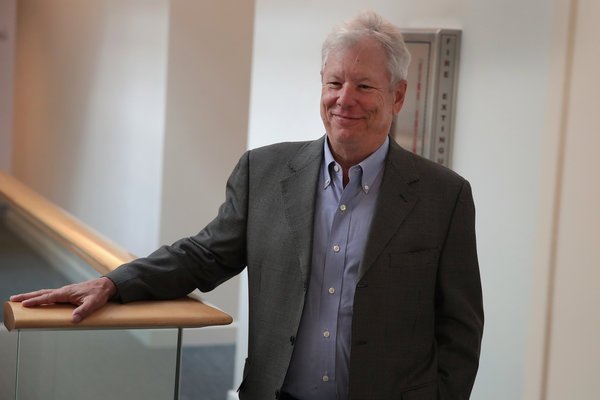Advertisement

By
Oct. 9, 2017
Richard H. Thaler, who won the 2017 Nobel Memorial Prize in Economic Science, is no stranger to our pages. Here are some of his notable columns. They exemplify his career-long efforts at humanizing economics, showing how the behavior of real people affects economic activity.
July 4, 2009
Mortgages Made Simpler
Introducing himself to Times readers, Mr. Thaler began with a warning that he was not a traditional economist. Instead, he said that he has practiced behavioral economics — which holds that imperfect humans don’t fit neatly into classic economic models — and that his body of work has explored the intersection between human quirks and economic forces.
OCT. 31, 2015
The Power of Nudges, for Good and Bad
Mr. Thaler embraced the use of nudges to encourage people to act in their own best interests, and he provided some real-life examples. Website recommendations, like all good nudges, he said, should be transparent, for your benefit and easy to reject.
MAY 8, 2015
Unless You Are Spock, Irrelevant Things Matter in Economic Behavior
In a traditional economist’s view, hungry shoppers are not subconsciously influenced by their stomachs to buy more food, and most people are inclined to think of cash as the best gift idea. Seemingly irrelevant factors like human emotions often influence their choices, altering the course of the economy.
APRIL 6, 2013
Shifting Our Retirement Savings Into Automatic
The problem: Many Americans do not save enough for retirement.
The solution: Nudging people to do the right thing, with redesigned retirement plans.
Mr. Thaler wrote that we know how to fix much of the retirement problem, and we can afford to, but need to figure out ways to help people who are just dropping the ball. He proposed automatically enrolling workers in I.R.A.s if their companies do not already provide sponsored retirement savings accounts. Automatic enrollment, with the freedom to opt-out, he said, will solve one of the biggest barriers to saving: procrastination.
SEPT. 26, 2009
Opting In vs. Opting Out
Many people in the United States say they are willing to become organ donors but never take the steps required to do so — filling out a form or officially registering their consent in some other way. Mr. Thaler said organ donation rates would increase with methods like “mandated choice” — a requirement that you make your preference about organ donation known, one way or the other — or with smartphone apps that make such choices much easier.
FEB. 23, 2013
Overcoming Obstacles to Better Health Care
Medical care is expensive, Mr. Thaler said, in part because there are too many incentives to do costly things that are unnecessary. As technology improves, for example, it is easier to investigate physical abnormalities — even when they are unlikely to cause problems. Extra testing increases costs, as do malpractice suits. Patients need to be better informed, he said, and should be empowered to opt out of procedures that are likely to rack up big bills without providing much benefit.
JULY 16, 2011
Getting the Most Out of Social Security
Annuities are an excellent retirement savings vehicle, he said, but many consumers find them confusing and off-putting. Yet most American retirees will receive an inflation-adjusted annuity anyway: Social Security. Those who can afford to wait for Social Security payouts should delay at least until they turn 70, he said, increasing their annual income appreciably.
Advertisement
Article source: https://www.nytimes.com/2017/10/09/business/economy/richard-thaler-economics.html?partner=rss&emc=rss
Speak Your Mind
You must be logged in to post a comment.